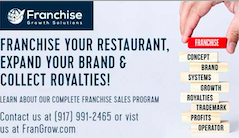It could be a Wine Bar with small plates, or a BBQ theme or a Create Your Plate concept. Whatever you decide, it is critical that the environment and “vibe” within the restaurant places the guest firmly inside the experience you’re attempting to create. Don’t confuse the guest with a concept that’s disconnected. As I often remind my clients, “everything touches everything else.”

BY GARY OCCHIOGROSSO – FOUNDER OF FRANCHISE GROWTH SOLUTIONS.
Tripwires to avoid – Desire and passion will only get you so far. Create your business plan as a road map.
For many people, opening a restaurant is a dream. One of the many things I find so interesting about the restaurant business is the blend of creative artistry and the detailed and challenging business aspects necessary to be successful. As an Adjunct Instructor at NYU’s School of Professional Studies, I teach restaurant concept development and business planning. On several occasions, I have been asked by my students to summarize the top issues that one must consider when planning to open a restaurant. Generally, regardless of the type of restaurant, the planning and considerations are the same. I’ll cover a few of the top line elements here.
At the beginning of the process, you should write a simple business plan. It would help if you thought about the many pieces of the puzzle connected to a successful outcome. Many novice restaurateurs, very often chefs, only consider the food component, but there is so much more. A well thought out business plan will include creating a unique concept, a competitive analysis, site selection, financial projections, equipment needs, staffing, and of course, the menu.
Let’s start with a concept
It’s essential that your restaurant offers a unique experience. It could be a Wine Bar with small plates, or a BBQ theme or a Create Your Plate concept. Whatever you decide, it is critical that the environment and “vibe” within the restaurant places the guest firmly inside the experience you’re attempting to create. Don’t confuse the guest with a concept that’s disconnected. As I often remind my clients, “everything touches everything else.” For instance, you wouldn’t use elegant tableware in a fried chicken restaurant or disposable plates in an upscale steakhouse. As obvious as this may seem on the broader elements, it’s essential to take that idea to every detail of the restaurant concept, no matter how small. Everything from the paint color to the music to the tabletops to the wall hanging must work together. The decor elements, the menu, and the service level need to provide the guests with a seamless experience that, when done well, goes almost unnoticed because it’s natural and authentic.
If You Build It, Will They Come?
Building a clientele is never as easy as hanging a sign over the door. It takes smart planning, execution of marketing, and living up to the promise in your mission and brand position statement. You should never assume, “if you build it, they will come.” Questions to ask yourself are; how will my restaurant connect with people? Why does my restaurant exist? What type of people am I looking to attract? What do they read or watch? How do they spend their spare time? What is the best way to reach them? Your concept should appeal to a particular, selected audience. There is no such thing as “everyone is my customer.” Knowing why and for whom your restaurant exists is crucial to success. Your marketing plan should offer compelling reasons why that guest base should frequent your establishment regularly. Is the concept created for health-conscious people? Is it aimed at Millennials or Baby Boomers? It is a full menu or dessert brand or a convenient, fast food, value-based concept. Your social media, print ads, and community outreach should focus on one single audience with one single message. Once you’ve built a loyal base of customers and repeat business, then you should consider expanding your base by marketing to others in the area with a proposition that appeals to them.
Your People Plan is Key
A great team will help you win everyday. Hiring great people is the first step in delivering service excellence and a consistent product to your guests. Your mission statement “the why” along with a corporate culture that emphasizes respect for employees, commitment to your guests, service to the community, and concern for the environment will guide you when selecting your staff. It’s not enough to hire people with restaurant experience; they should also understand and be excited about the mission of the restaurant. If not, they will go through the motions with an inauthentic approach and often fail at exceeding guest expectations. Examine your corporate core values and hire people that match it. Next, supply your staff with comprehensive, ongoing training and the proper tools so can they carry out the day to day tasks flawlessly. Hire for qualities, train for skills.
The Market and Competition
Understanding the market area where you’d like to open your restaurant is a crucial element to the plan. Carefully research the demographics to ensure there are enough people in the area that match whom you believe will embrace your concept. When looking for your location, work with an experienced commercial broker that can supply you with data to help you choose the area and the site correctly.
A full competitive analysis is also essential. For example, check the pricing of your competition. Be sure you’re not over or underpriced for the market. Check other services they offer, such as delivery and online ordering. Spend time in the market area, dine several times at as many competitors as possible, and position your restaurant to address the missing needs in the market. Having a unique value and selling proposition will keep you ahead of the game. Remember, everyone is vying for the same consumer dollars, so you need to create points of differentiation that will help your establishment stand out from the competition.
Consistently Great Food
Your menu must not only be relevant to the concept and the market but should be prepared and served perfectly every time. Restaurant guests expect dishes they grown to love to have the same flavor and high quality each time they visit. Inconsistent products can lead to disappointed guests, bad reviews, and slumping business. Your menu should be not only delicious but also simple to execute. The more straightforward the menu, the less chance of mistakes in preparation. Consistency increases guest satisfaction. Some chefs and “foodies” create menu items that are too complicated and require a highly skilled professional in the kitchen. This approach is fine if you intend to open a high-end restaurant staffed with high price personnel, but not in a fast-casual or family restaurant setting. A winning menu is simple, fresh, relevant, and great tasting. A competent chef can assist in developing dishes that are unique and great tasting that are also simple to produce with less skilled labor. If you have aspirations of owning more than one location, then simple execution, and consistent products are a must to achieve the goal of operating multiple restaurants.
Cash Is King
There are many reasons why restaurants fold. It could be the wrong concept, poor choice of location, not correctly researching the competition, poor service, an uninspiring menu, or bad food, to name a few. That said, the negative impact of undercapitalization may be the most frequent cause of restaurant failures. Knowing how much money you need to launch the restaurant is only the tip of the iceberg. You must assess ongoing cash needs while the restaurant is newly opened and gaining momentum. It may take many months for a restaurant to break even and then eventually become profitable. Being able to support the financial needs during this phase is often the “make or break” challenge that many new restaurateurs cannot overcome. A well thought out projection model that you create with the help of a professional financial advisor can save you from the frustration, negative financial impact and heartbreak of a failed restaurant. Considering capital needs for the first twelve to fifteen months is not only prudent but essential to the success of any new restaurant. You must be prepared to cover the operational costs and expenses as the restaurant “ramps up.” Carefully consider your cash needs and how much working capital you must have on hand, ready to deploy.
Have A Plan And Follow Your Dream
Owning a restaurant can be personally rewarding and profitable. Many people have built great restaurant companies following these simple guidelines. Desire and passion will only get you so far. Create your business plan as a road map. Your plan will help you stay on track when dealing with the many moving parts of launching and successfully operating a new restaurant.
For information on hiring the right restaurant consultant to help you get started visit: www.franchisegrowthsolutions.com

